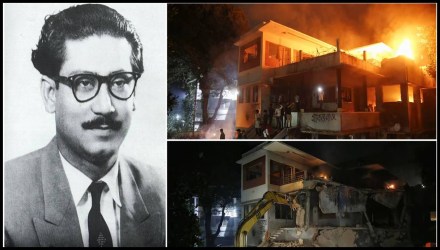The destruction of Sheikh Mujibur Rahman’s residence in Dhaka has sparked widespread concern, as radical student groups and militant factions are now threatening to target more historical monuments dedicated to Bangladesh’s founding father. Following the demolition of the Dhanmondi house, the next targets are feared to be his ancestral home in Gopalganj and his mausoleum.
According to Dhaka based sources the mob responsible for the destruction included members of Hizb ut-Tahrir, Al Qaeda, and Ansar Al Islam. “After demolishing Sheikh Mujibur Rahman’s home at Dhanmondi road 32 in Dhaka, the mob moved on to destroy the home of Mujib’s younger brother Sheikh Naser in Khulna,” a source said.
The situation remains tense, with protesters and radical groups threatening to escalate their actions. According to reports quoting Professor Nazmul Ahsan Kalimullah, a political commentator based in Dhaka, “The next target will likely be Sheikh Mujib’s ancestral home in Gopalganj and his mausoleum. ”
Despite the grave situation, the Bangladesh Army, which had been deployed, reportedly remained passive during the violence, raising questions about the government’s control over the unrest.
India Reacts: Strong Condemnation of Attack on Bangladesh’s Heritage
In response to the attacks, India has strongly condemned the destruction of Sheikh Mujibur Rahman’s house, calling it an attack on the historical and national consciousness of Bangladesh. “This act of vandalism should be strongly condemned, ” said Randhir Jaiswal, spokesperson for Ministry of External Affairs.
He stressed that the house, where Sheikh Mujib and his family were tragically assassinated in 1975, is an essential part of Bangladesh’s history and identity.
“This house is a symbol of the heroic resistance of the people of Bangladesh against the forces of oppression,” Jaiswal added. His statement came after Bangladesh’s foreign ministry lodged a protest against Hasina’s remarks from exile in India, which many in Dhaka view as provocative.
Student Protests Fueling Political Tensions
Student-led protests have been at the heart of the ongoing unrest in Bangladesh. Last year, these protests turned violent, with students demanding the removal of the interim government and the return of former Prime Minister Sheikh Hasina. Hasina, who has been in India since fleeing Bangladesh in August, made remarks about the attack on her father’s residence, stating, “They can demolish a building, but not the history. But they must also remember that history takes its revenge.”
As the unrest continues, Bangladesh’s interim government has urged restraint, but the situation appears to be spiraling.
Growing Diplomatic Tensions between India and Bangladesh
The violence surrounding Sheikh Mujibur Rahman’s monuments has also strained Bangladesh-India relations. Dhaka has criticized India for allegedly allowing Hasina to make statements while in exile. The ongoing political instability in Bangladesh and India’s involvement have become a major diplomatic concern. With protests intensifying, both Bangladesh and India face a challenging future. The ongoing attacks on historical sites and rising anti-India sentiments among protesters signal that the situation could deteriorate further unless a peaceful resolution is found
